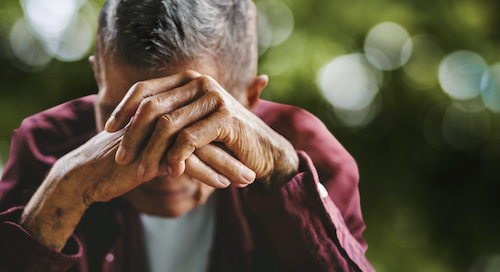Depression is very real and needs to be treated seriously. But even the happiest people can develop something called Seasonal Affective Disorder (SAD), which is a form of depression that occurs about the same time each year and is related to seasonal changes, according to Mayo Clinic. The aging population typically experiences SAD in the winter months since the days are shorter, there’s less sunlight, and is typically gloomier. If you’re providing senior care or simply looking after a loved one, be sure to identify these symptoms of seasonal depression and take steps to help them.
Apathy Or Loss Of Energy
Losing interest in things like family gatherings or participating in activities they would typically enjoy doing is a sign of seasonal depression. Seniors may blame their apathy for not having enough energy to do it since they are older, but they may not even realize they are falling into a depressed state.
Weight Loss Or Weight Gain
Unless a senior is trying to lose weight or gain weight intentionally, don’t overlook any unintended physical changes. The winter months can lead to staying inside more often, which can turn into more snacking, less physical activity, and living more of a sedentary lifestyle. Monitor any physical changes in your senior loved one and talk to them if you notice any drastic changes.
Irritability
It’s normal to be irritable occasionally during certain situations. But if irritability becomes more of the norm than the exception with their personality, then there may be an underlying issue causing it. Not being able to spend time outdoors can take a toll on a senior’s mental and physical health.
Constant Fatigue Or Feelings Of Worthlessness
There’s nothing like staying in your pajamas in your warm bed on a cold winter day. However, staying in bed all day every day can lead to unintended consequences. Seniors who don’t move around enough may experience constant fatigue and can eventually lead to feelings of worthlessness. Keeping the mind and body stimulated is an important component of independent living, and sometimes seniors need to be reminded of this to avoid falling into seasonal depression.
How To Help A Senior Suffering From Seasonal Depression
Providing senior care to a loved one during the fall and winter months can go a long way in helping them avoid seasonal depression. Activities like walking with them for 30 minutes each day or doing indoor exercises can keep their blood flowing. Help them plan their meals to avoid too much snacking throughout the day and to set healthy habits. Getting advice from a doctor and talking with a loved one can help them enjoy independent living more and avoid feelings of depression.
Next Day Access wants to help you provide the appropriate amount of senior care needed to take care of your loved one. To learn more about improving accessibility in your loved one’s home, contact us at any time.





